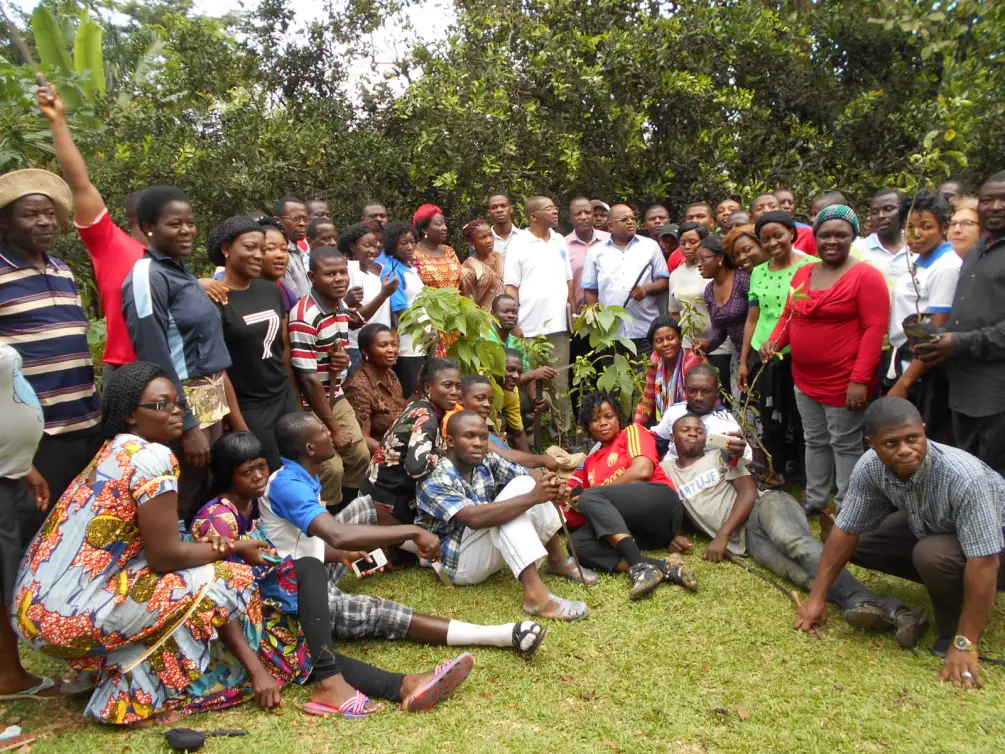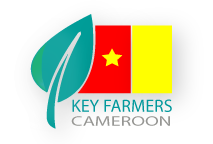Key Farmers Cameroon News
Vocational training for displaced people
Key Farmers Cameroon Trains Student Pastors of Presbyterian Theological Seminary on Agroforestry Techniques
On October 17-19, 2016, Key Farmers Cameroon national coordinator Etchi Daniel Jones led a three-day workshop on Vegetative Propagation with the student pastors and other members of the Presbyterian Theological Seminary in Kosala. The goals of the workshop were to empower these student pastors with innovative agricultural skills so that they could utilize the farmland behind their seminary and increase their food supplies and incomes. The second goal was for these student pastors to empower their Christians and non – Christians in their various congregations in different rural communities and towns were they will be posted to preach the word of God after graduation.
The first day focused on detailed lectures surrounding marcotting, grafting and budding and the second and third days applied that knowledge into practice. Over 70 members participated in the three-day workshop, including the Dean of studies and 5 lecturers and other staff. Participants were eager and attentive during the training and are looking forward to their future application of vegetative propagation as their own contribution in promoting food security and environmental conservation.

Key Farmers

Cameroon
Launching of Biochar Project

In the past month, Key Farmers Cameroon (KFC) in partnership with Carleton University (CU) and Viresco Solutions (VS) launched their project, “Agriculture, Labor, and Gender Equity: The Role of Biochar” in the Meme and Manyu Divisions of the Southwest Region of Cameroon. KFC, CU and VS aim to investigate the impacts of biochar on women’s labor and livelihoods through an integrated approach of pre and post focus groups combined with continuous monitoring on biochar production and impacts throughout the duration of the project.
The objectives of this study are to identify the barriers women face in producing and using biochar to grow nutritious food crops; the impact of on-farm biochar production on women’s workloads and livelihoods; and the impacts of biochar on traditional gender roles/responsibilities. Two women’s common interest groups (CIG’s), the Sunshine Ladies of Kendem in the Manyu division and the Ambitious Women of Kake in the Meme Division have been selected to participate.
Thus far, each group has been provided with 20 biochar producing kilns, and Ambitious Women have also been provided with a biochar crusher. Prior to kiln distribution, recipients participated in a focus group to discuss their current livelihoods. This baseline data will serve as a useful reference and comparison for the post intervention focus group to be held towards the closing of the study. Since distribution, Sunshine Ladies and Ambitious Women have begun using their kilns to produce biochar and are eager to test its application in the upcoming planting season.
Key Farmers Cameroon to Head Humid Tropics Platform for SW Region

Humid Tropics, ICRAF, AVRDC, IITA and CIRAD have joined in collaboration to launch innovation platforms in Cameroon. Nationwide, three sites have been selected; Bamenda in the NW, Mbalmayo in the South and Kumba in the South West. As a well-connected, knowledgeable and influential organization, Key Farmers Cameroon has been selected to lead the efforts of farmers, producers, processors and business people in Kumba. The mission of the Innovation Platform is “to mobilize stakeholders along selected commodity value chains to work in line with Humid Tropics in order to improve the livelihoods of farmers via the Road for Development.” Thus far, the platform has selected maize, cassava, huckleberry and okongobong as their focus crops and has created two demo plots, one in Kumba and another in the neighboring village of Konye. Key Farmers is excited to head this venture and hopes to successfully bring together community stakeholders from various links in the agricultural value chain to empower farmers and other community members throughout the region.

Increasing Food Security & Product Transformation in Rural Communities of Kumba // Solar Food Dryer Project
On May 28th, 2015 Key Farmers Cameroon in collaboration with a U.S. Peace Corps volunteer launched their solar food dryer project. After two informational meetings in Kumba and a neighboring village of Kake, interest and excitement among farmers, producers and processors is booming. Following review and evaluation of the capacity of the project it was decided that 72 farmers would be included in this pilot phase. The construction of the dryers is set to commence in August and will be followed by processing and transforming workshops as well as business classes to aid in marketing these new value added products.
For a more detailed description of the background and objectives of the project please refer to the explanation below.
Due to a multitude of reasons including poor farm to market roads, seasonality of crops, competition among farmers and lack of preservation techniques and know how, the vast majority of farmers in Kumba suffer post harvest losses. Traditional sun drying methods, which are usually the first step in conservation and processing, have many disadvantages such as sanitation, pests and insects, vitamin loss, exposure to rain and extended drying time. Because of these challenges as well as lack of transformation and processing knowledge, farmers have yet to enter the value chain process and continue to suffer food insecurities. By adding value to their products, farmers can increase their incomes and livelihoods while simultaneously supporting food security in their homes and communities.
The objectives of this project are three fold and all comprehensive. The first stage involves the creation of individual dryers to be distributed to the according farmers and farmer groups. The second stage involves holding various trainings to teach farmers and producers how to process and transform a variety of products. Then the final stage, in coherence with monitoring and evaluating will be training producers on how to market their new value added products both nationally and internationally and assisting them in discovering new markets. Basic business skills and training would complement this stage as well.
The advantages of this solar food drying model/technology are overwhelming and not only will its ownership more effectively dry and preserve food stuffs, but it will also encourage further transformation. All in all, this inclusive process can lead to increased livelihoods for farmers throughout and will help fight food insecurities in the region.
The ideal outcome for this project is expansive. Individuals who take full advantage of trainings and newly acquired knowledge on top of their solar food dryers will process and transform their crops, marketing them at a higher value and henceforth increasing their incomes and livelihoods. At the very least, farmers will be equipped with an improved drying technology that will effectively dry numerous food stuffs, therefore reducing food insecurities in their homes and communities. By taking this first step in food processing and preservation, farmers and producers can create vast opportunities for themselves.



